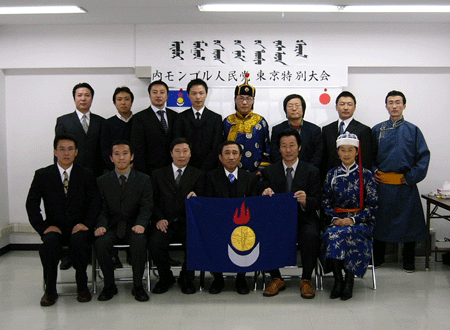| |
|
SMHRIC |
|
March 3, 2006 |
|
Tokyo, Japan |

With the
goal of fighting for freedom, independence and human rights for
the Southern (Inner) Mongols, the Inner Mongolian People's Party
(IMPP) held a special meeting in Tokyo, Japan from February 25
to 26, 2006.
Members
came from Mongolia, Sweden, Germany, Norway, United States, and
Japan to amend the organization's by-laws and set-up additional
branches.
"A
significant difference between this meeting and previous ones is
that this meeting was held in Japan, home to the largest
Southern Mongolian community outside Southern Mongolia," E.
Khuvisgalt, one of the organizers of the meeting, said to the
SMHRIC. "The IMPP will now shift its focus to Japan for future
work."
To resist
the Chinese Government's ever worsening colonial policy,
Southern Mongols have relentlessly continued their anti-Chinese
movements in various ways including underground groups that are
still active in Southern Mongolia. The IMPP is one such
organization and is named after the "Inner Mongolian People's
Revolutionary Party," a Southern Mongolian political party
created in the early 20th century that ceased to exist when the
Chinese Communist Party took control of the region in 1947.
During the Cultural Revolution, Chinese authorities carried out
a massacre against Southern Mongols under the pretext of
"uncovering and cleaning up" the underground activities of the
"New Inner Mongolian People's Revolutionary Party" - a party
that did not exist in Southern Mongolia at that time.
During the
special Meeting, Mr. Temtsilt Shovtsood, who lives in Germany as
a political refugee, was re-elected as the president of the IMPP.
In addition, the
"Tokyo Declaration" was adopted and published
in Mongolian,
Chinese and
Japanese languages. The Declaration
states that the Southern Mongolians, like all other people
around the world, shall have the right to determine their
political status including self-governance and political
independence. The IMPP is committed to bringing about this
aspiration through peaceful means. The declaration also notes
that a government in exile will be established when conditions
mature.
|





